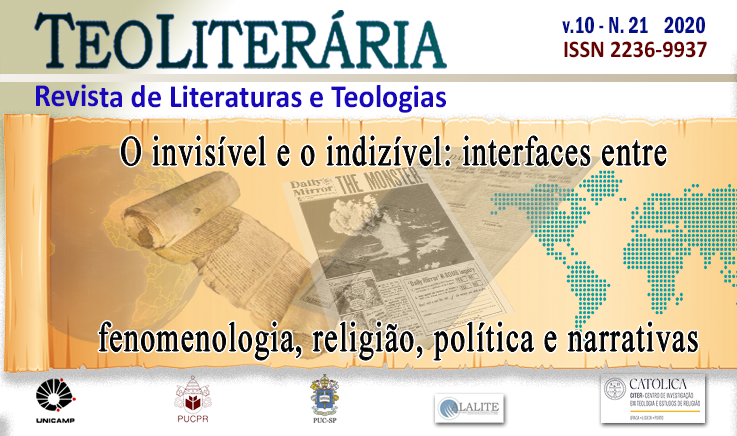Love’s crossing through self-emptying language: Augustine of Hippo’s confessio and Adélia Prado’s mystical poetry
DOI:
https://doi.org/10.23925/2236-9937.2020v21p445-469Keywords:
Crossing, Augustine of Hippo, Adélia Prado, Humility, LoveAbstract
“Crossing” can be described as a displacement between two points, characterized by a starting point, a path and a point of arrival. In addition to the geographical, exterior voyage, crossing is a metaphor for the wandering heart in via, an inner journey. This work approaches two “boatmen” who propose the crossing of inner life, the 4th-5th century North-African theologian Augustine of Hippo and Brazilian poet Adélia Prado. Augustine and Adélia Prado use self-emptying language, confessio and mystic poetry respectively, to express their existential poverty. While Augustine crushes his pride through the vulnerability of confession, Adélia Prado uses poetic language as spiritual exercise to annihilate her ego. This self-emptying language is not only informative, but performative speech; it is the language that affirms finitude and vulnerability, opening the self to a journey of longing towards an alterity. The ultimate goal of humbling oneself in poetic vulnerability before the Mystery is to capture the dynamic invitation to love. Augustine’s confessional language and Adélia Prado’s poetry foster the passage from self-centeredness to a loving relational center. Adélia Prado can help us read Augustine not only as the doctor of Grace, but as “Doctor Humilitatis”, a reception clouded by centuries of theological discussion.
References
AUGUSTINE, Saint. The Confessions. The Works of Saint Augustine: a translation for the 21st Century I/1. 2nd ed. New York: New City Press, 2012. Translated by Maria Boulding.
BINGEMER, Maria Clara. Teologia e Literatura: afinidades e segredos compartilhados. Petrópolis: Vozes, 2015.
BRACHTENDORF, Johannes. Confissões de Agostinho. Sao Paulo: Loyola, 2008.
BROWN, Peter. Augustine of Hippo. Berkeley: University of California Press, 2000.
BURTON, Philip. Language in the Confessions of Augustine. Oxford: Oxford University, 2007.
DUPONT, Anthony and WALRAET, Pierre-Paul. “Augustine on the Heart as the Centre of Human Happiness.” Studies in Spirituality, 25 (2015): 45-77.
ICARD, Simon. “Augustin, docteur de la grâce: histoire d'un titre.” Revue d’études augustiniennes et patristiques, vol. 63, n. 1, 2017: 181-198.
MARTIN, Thomas F. Our Restless Heart: The Augustinian Tradition. Maryknoll: Orbis Books, 2003.
NAVARRO, José Francisco. La mística de cada día: poesía de Adélia Prado. Lima: Fondo Editorial, 2009.
OROZ RETA, José. Conversion. In: FITZGERALD, Allan (Ed.). Augustine through the ages: an encyclopedia. Grand Rapids: Eerdmans, 2009. p. 239-241.
PIERETTI, Antonio. “Doctrina antropológica agustiniana.” In: OROZ RETA, José; GALINDO RODRIGO, José A. El pensamiento de San Agustin para el hombre de hoy: la filosofia agostiniana Valencia: EDICEP, 1998. Vol. 1, p. 329-404.
PRADO, Adélia. Bagagem. Rio de Janeiro: Imago, 1976.
PRADO, Adélia. “Arte como experiência religiosa”. In: MASSIMI, Marina; MAHFOUD, Miguel. Diante do Mistério. São Paulo: Loyola, 1999. p. 15-32.
PRADO, Adélia. Interview to Ellen Doré Watson. BOMB, No. 70, The Americas (Winter, 2000), p. 62-67. Translated by Martins, Eva Golinger and Ernesto Solorzano.
PRADO, Adélia. Ex-Voto: poems of Adélia Prado. North Adams: Tupelo Press, 2013. Translated by Ellen Doré Watson.
PRADO, Adélia. Poesia Reunida. 4. ed. Rio de Janeiro: Record, 2017.
THEOBALD, Christoph. A revelação. São Paulo: Loyola, 2006.
VILLAS BOAS, Alex. Teologia em diálogo com a literatura: origem e tarefa poética da teologia. São Paulo: Paulus, 2017
Downloads
Published
How to Cite
Issue
Section
License
Copyright (c) 2020 Teoliteraria - Journal of Literatures and Theologies (On Line) ISSN 2236-9937

This work is licensed under a Creative Commons Attribution 4.0 International License.
TeoLiteraria – Journal of Literatures and Theologies owns the copyright of all published material. The whole reproduction of the articles of this Journal in other publications or for any other purpose, by any means, requires a written permission of the editor of this journal. Partial reproductions of articles (abstracts, more than 500 words text, tables, figures and other illustrations) must have a permission written by the publisher and the authors.

